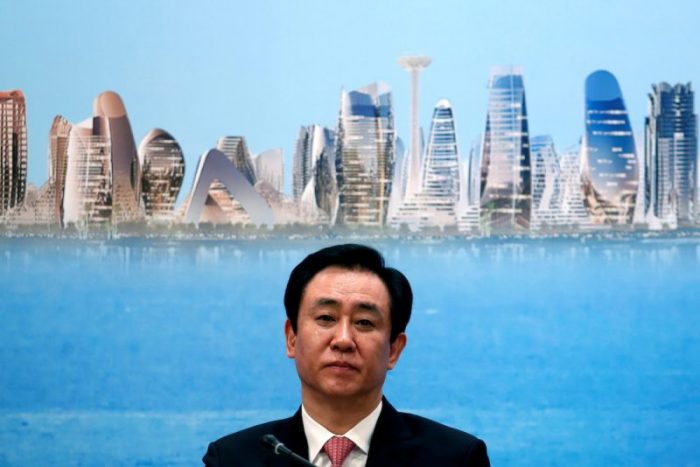China Evergrande Group stock tumbled 19% to an all-time low on Monday after the real estate firm said Friday there was no guarantee it would have enough funds to meet debt repayments, a move that prompted Chinese authorities to summon its chairman.
Evergrande share price fell as a 30-day grace period on a coupon payment of $82.5 million due on November 6 comes to an end on Monday.
At the end of Asia business hours, two bondholders said they had yet to receive payments from Evergrande, while the real estate company declined to comment.
Evergrande, once China’s top-selling real estate developer, is grappling with more than $300 billion in debt. Evergrande’s collapse could send shockwaves through China’s real estate sector and beyond.
In a filing late on Friday, Evergrande, the world’s most indebted real estate developer, said it had received a demand to service its debt worth about $260 million.
That prompted the government of Guangdong province, where Evergrande is based, to summon the real estate firm’s boss Hui Ka Yan. It issued a statement to say it would send a working group to the developer at Evergrande’s request to oversee risk management, strengthen internal controls and maintain normal operations.
In a series of apparently coordinated statements late in the evening, China’s central bank, banking and insurance regulator and its securities regulator sought to reassure the China stock market that any risks to the broader real estate sector could be contained.
Short-term risks caused by a single real estate firm would not undermine market fundraising in the medium and long-term, the People’s Bank of China said, adding that housing sales, land purchases and financing “have already returned to normal in China”.
And on Monday the central bank said it would cut reserve requirements for banks while the Politburo vowed to promote healthy development of China’s real estate sector, reinforcing previous messages to stock investors that Evergrande’s woes could be contained.
Its stock fell more than 19% to HK$1.81 at the close of trading in Hong Kong, its lowest ever.
Evergrande’s November 2022 bond – one of two bonds that could go into default on non-payment on Monday – was trading on China’s stock market at the distressed price of 18.560 US cents on the dollar, compared with 20.083 cents at Friday close.
“Evergrande’s been trying to sell assets to repay debt, but [the] Friday statement basically says it is going to ‘surrender’ and need help,” Conita Hung, an investment strategy director at Tiger Faith Asset Management, said. “This sends a very bad signal.”
She said given the large size of its debt, China Evergrande’s problems would take years to solve, even with state intervention.
Evergrande Faces Unprecedented Squeeze
Evergrande has been struggling to raise capital by disposing of assets, and the government had asked chairman Hui Ka Yan to use his wealth to repay company debt.
The firm is just one of a number of real estate developers facing an unprecedented liquidity squeeze due to regulatory curbs on borrowing, causing a string of offshore debt defaults, credit-rating downgrades and sell-offs in developers’ shares and bonds.
To prevent further turmoil, regulators since October have urged banks to relax lending for developers’ normal financing needs and allowed more real estate firms to sell domestic bonds.
To free up funds at banks, Premier Li Keqiang on Friday said China will cut the bank reserve requirement ratio (RRR) “in a timely way” to increase support for the real economy.
Still, the government may have to significantly step up policy-easing measures in the spring to prevent a sharp downturn in the real estate sector, Japanese investment bank Nomura said in a report published on Sunday.
Flurry of Real Estate Defaults Possible
Smaller real estate developer Sunshine 100 China Holdings Ltd said on Monday it had defaulted on a $170-million US-dollar bond due on Sunday December 5 “owing to liquidity issues arising from the adverse impact of a number of factors including the macroeconomic environment and the real estate industry”.
The delinquency will trigger cross-default provisions under certain other debt instruments, the real estate developer said. Its shares fell nearly 3%.
Last week, Kaisa Group Holdings – the largest offshore debtor among Chinese developers after Evergrande – said it had failed to secure approval from offshore bondholders to carry out an exchange offer of its 6.5% offshore bonds due on Tuesday December 7, without which it said it would risk default.
Evergrande has begun talks with some of the offshore bondholders to extend the deadline for the $400 million debt repayment, sources have told Reuters.
Smaller rival China Aoyuan Property Group Ltd last week also said creditors have demanded repayment of $651.2 million due to a slew of credit-rating downgrades, and that it may be unable to pay due to a lack of liquidity.
- Reuters with additional editing by Kevin Hamlin
This report was updated on Monday December 6.
ALSO SEE:
China Evergrande Group Warns Of Non-Payment Of Over $260m Debt
China Province Guangdong Summons Evergrande as Regulators Reassure Markets
Evergrande Stock Drops After Boss Hui Ka Yan Slashes Stake
























